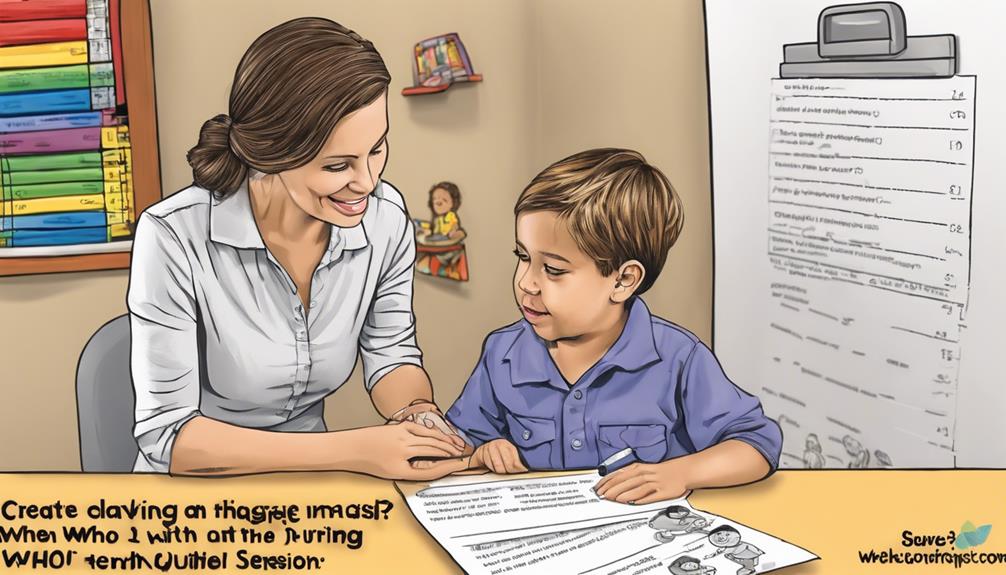Embarking on the journey of establishing a private practice speech therapy clinic is akin to laying the foundation for a sturdy house; every decision made shapes the structure and stability of the enterprise.
But what truly sets a thriving clinic apart?
Stay tuned to discover the key elements that can elevate your clinic from a mere concept to a reputable establishment that fosters growth and impact in the realm of speech therapy.
Key Takeaways
- Obtain NPI and ensure HIPAA compliance for legal and regulatory requirements.
- Develop a robust business plan for funding and market positioning.
- Create a welcoming clinic with effective marketing strategies for client acquisition.
- Enhance service portfolio, revenue generation, and client outcomes through continuous professional development.
Legal Requirements
To establish our speech therapy clinic, we must ensure compliance with legal requirements, including obtaining a National Provider Identifier (NPI) number for insurance billing and setting up a HIPAA-compliant structure for patient privacy and data security. It's crucial for our business to protect sensitive client information and adhere to insurance regulations. By obtaining an NPI number, we can efficiently bill insurance companies for the services provided to our clients. Additionally, setting up a HIPAA-compliant structure ensures that patient information remains private and secure, building trust with our clients.
Moreover, choosing the right business entity, such as an LLC or sole proprietorship, can provide legal protection and tax advantages for our practice. Applying for a government-issued tax identification number further legitimizes our financial transactions and ensures compliance with tax regulations. Understanding the legal aspects of starting a private speech therapy practice is essential to safeguard our business, maintain client confidentiality, and operate ethically. By adhering to these legal requirements, we can establish a solid foundation for our speech therapy clinic.
Business Plan Development

Developing a comprehensive business plan is essential for strategically outlining the goals, strategies, and financial projections of our private practice speech therapy clinic. A well-crafted business plan serves as a guiding document to navigate the challenges and opportunities in establishing a successful clinic. Elements to include in the business plan are market analysis, service offerings, marketing strategies, operational structure, and financial projections. By researching the target market, analyzing competitors, and forecasting expenses and revenues, we can create a robust plan that will help in securing funding, attracting potential investors, and providing a roadmap for growth and success.
| Aspect | Description |
|---|---|
| Market Analysis | Research target market, identify competitors, and assess industry trends. |
| Service Offerings | Outline the speech therapy services provided and their unique selling points. |
| Marketing Strategies | Detail how we plan to promote our clinic and attract clients. |
| Financial Projections | Forecast expenses, revenues, and profits for the upcoming years. |
Location and Setup
Selecting a location with high visibility and convenient accessibility for clients, particularly in close proximity to schools or medical facilities, is crucial for the successful establishment of our speech therapy clinic.
It's essential to ensure that the clinic space meets all zoning and licensing requirements to operate as a healthcare facility. Setting up treatment rooms with appropriate equipment and materials tailored for speech therapy sessions is a professional standard we aim to achieve.
Additionally, creating a welcoming and comfortable waiting area for clients and their families is vital to provide a positive experience. When considering the clinic's layout, privacy and confidentiality during therapy sessions should be carefully planned to uphold professional standards.
Marketing Strategies

Utilizing social media platforms like Facebook and Instagram to showcase success stories and client testimonials is an effective strategy for attracting new clients to our speech therapy clinic. By regularly posting engaging content and interacting with our audience online, we can increase our clinic's visibility and reach a broader community. In addition to social media, offering free workshops or webinars on speech therapy topics can demonstrate our expertise and help build trust within the community.
Collaborating with local schools, pediatricians, and other healthcare providers can also be instrumental in generating referrals and expanding our professional network. Investing in search engine optimization (SEO) for our website is crucial for improving online visibility and attracting organic traffic to our clinic. Furthermore, implementing a referral program that rewards existing clients for referring new clients can incentivize word-of-mouth marketing and enhance our client base. By combining these marketing strategies, we can effectively promote our services and establish a strong presence in the community.
Client Relationship Management
We prioritize effective communication strategies to foster strong relationships with our clients.
By offering flexible scheduling options, we aim to cater to the unique needs of each individual we serve.
Our commitment to providing exceptional customer service ensures that our clients feel valued and supported throughout their therapeutic journey.
Communication Strategies With Clients
Effective client communication is foundational to establishing a strong rapport and ensuring clear understanding in speech therapy clinics. Implementing communication strategies, offering flexible scheduling, providing excellent customer service, utilizing scheduling software, and analyzing reasons behind no-shows all contribute to a positive client experience. By communicating effectively, such as actively listening, using plain language, and providing feedback, speech therapists can better understand their clients' needs and tailor treatment plans accordingly. The table below outlines key factors in client communication strategies:
| Communication Strategies | Flexible Scheduling | Customer Service |
|---|---|---|
| Active listening | Various time slots | Personalized care |
| Plain language | Online booking | Prompt responses |
| Feedback provision | Teletherapy options | Follow-up support |
Building Trust With Clients
To enhance client trust and foster strong relationships in a speech therapy clinic, it's crucial to implement effective communication strategies and prioritize client confidentiality. Respecting client confidentiality ensures a secure therapeutic environment, while offering flexible scheduling options demonstrates a commitment to meeting clients' needs.
Providing excellent customer service showcases professionalism and dedication to client care. Seeking and responding to client feedback is essential for continuous improvement and strengthening relationships. Additionally, ensuring the protection of Protected Health Information (PHI) through measures like professional liability insurance further solidifies trust.
Financial Management

As we delve into the realm of financial management for our speech therapy clinic, it's crucial to meticulously budget for expenses and strategize revenue generation methods. By calculating startup costs and planning for ongoing expenses, we can ensure a stable financial foundation.
Considering revenue sources and developing a flexible budget will be instrumental in sustaining our clinic's financial health.
Budgeting for Expenses
How can we accurately estimate the initial and ongoing costs associated with establishing a speech therapy clinic to ensure financial stability and effective management? When budgeting for a private speech therapy practice, consider startup costs such as rent, equipment, software, and initial supplies. Factor in ongoing expenses like utilities, insurance, marketing, and staff salaries. Research average costs for liability insurance, professional licenses, and accreditation fees to ensure financial preparedness. To maintain financial stability, set aside funds for unexpected expenses or emergencies. Create a detailed budget outlining monthly operational costs and projected revenue. Below is a table outlining typical expenses to consider:
| Expense Category | Description | Estimated Cost |
|---|---|---|
| Startup Costs | Rent, Equipment, Software | $XX,XXX |
| Ongoing Expenses | Utilities, Insurance, Salaries | $X,XXX |
| Miscellaneous Costs | Marketing, Accreditation Fees | $X,XXX |
| Contingency Fund | Emergency Reserve | $XX,XXX |
| Total Estimated Costs | $XXX,XXX |
Revenue Generation Strategies
Implementing tiered pricing models allows for catering to various client needs and budgets while optimizing revenue potential. When considering revenue generation strategies for our small business, we focus on:
- Offering package deals or discounted rates for multiple sessions to encourage client retention.
- Utilizing telepractice services to reach clients in remote or underserved areas, expanding our revenue potential.
- Developing a diversified service portfolio including assessments, therapy sessions, and workshops to maximize revenue opportunities.
Continuous Professional Development

Engaging in continuous professional development in speech therapy is crucial for enhancing clinical skills and staying updated on industry trends, techniques, and research. Ongoing education opportunities play a vital role in ensuring that speech therapists are well-equipped to provide high-quality services to their clients. This involves attending workshops, webinars, conferences, and courses to expand knowledge and expertise continually. Additionally, seeking mentorship, participating in peer learning groups, and staying informed on regulatory changes are beneficial practices for speech therapists.
Investing in continuous learning not only helps maintain competency but also leads to improved outcomes for clients. By staying abreast of the latest developments in the field, speech therapists can adapt their practices to best serve those in need of their services. Professional development is essential for advancing in the field of speech therapy and staying relevant in a constantly evolving industry.
Frequently Asked Questions
How Do I Start a Private Practice as a Speech Pathologist?
Starting a private practice as a speech pathologist involves obtaining necessary credentials, developing a business plan, securing insurance coverage, and establishing a professional network.
We need to be aware of legal and ethical considerations, such as HIPAA compliance and documentation standards.
Building referrals and collaborative opportunities with healthcare providers, schools, and community organizations is crucial for success.
It's important to have a solid foundation in place to ensure a successful start in this field.
How Much Does Private Speech and Language Therapy Cost?
Private speech and language therapy costs can vary greatly, typically ranging from $100 to $250 per hour in the United States. Some clinics offer discounts for multiple sessions which can help reduce overall costs.
Insurance coverage varies, so it's important to check with your provider and insurance company. Sliding scale fees or financial assistance programs may be available for those with financial constraints.
It's crucial to explore all options to access needed therapy services.
How Do You Name SLP Private Practice?
When naming our private practice, it's crucial to consider our specialty, ensure easy recall, check for trademarks, reflect our values, and seek feedback. A name should resonate with our mission and services while being client-friendly.
Feedback from peers, friends, and potential clients can help gauge the appeal and relevance of the chosen name. It's essential to create a name that encapsulates the essence of our practice and resonates with our target audience.
Is Private Speech Therapy Worth It?
Private speech therapy is definitely worth it. We've seen remarkable progress and outcomes in individuals who opt for private sessions.
The personalized attention and tailored approaches have led to faster advancements compared to group therapy. Clients appreciate the flexibility, privacy, and specialized care they receive in this setting.
Conclusion
In conclusion, establishing a private practice speech therapy clinic requires careful planning and execution.
While some may worry about the competitive nature of the healthcare industry, our clinic is equipped with a strong business plan, effective marketing strategies, and a commitment to continuous professional development.
By prioritizing client care, maintaining legal compliance, and focusing on financial management, we're confident in our ability to provide high-quality services and thrive in this competitive market.










